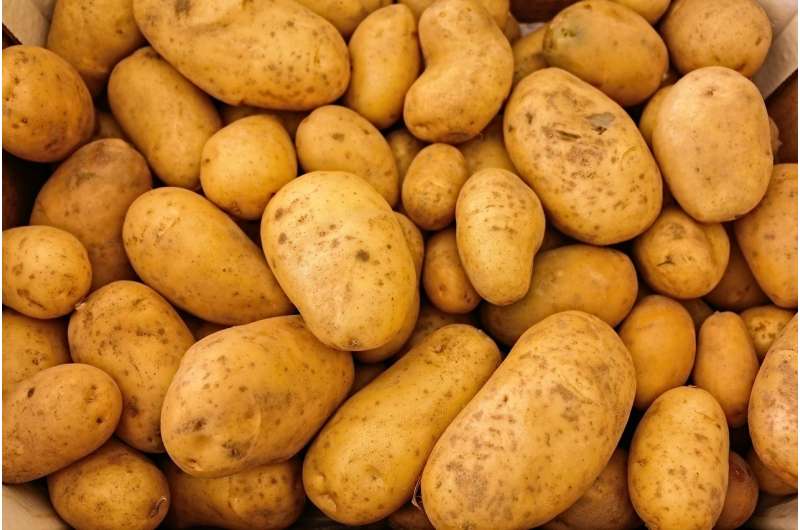June 16, 2025 | 11:28 GMT +7
June 16, 2025 | 11:28 GMT +7
Hotline: 0913.378.918
June 16, 2025 | 11:28 GMT +7
Hotline: 0913.378.918

Photo credit: CC0 Public Domain
The process, however, is far from straightforward because of the complex genetic make-up of potato and its outcrossing nature. However, Ph.D. candidate Corentin Clot of Wageningen University & Research made a number of discoveries related to potato sexual reproduction that could simplify the breeding of this important crop.
Potato is one of the major staple crops worldwide, making it crucial to create varieties that combine excellent qualities with resistance against diseases and pests. Yet, the journey to develop these varieties is complex, as Corentin Clot explains. "Most potato varieties are tetraploid, which means they possess four copies of each chromosome, each containing its own hereditary information."
This genetic complexity poses a challenge when it comes to passing on desired traits from crossing parents to their offspring. Clot says, "To ensure that these traits can be transmitted as a whole into the next generation, the parents must be 'homozygous'. This implies that identical versions of the gene are present on all chromosomes. This is easily achieved in diploid potato through one round of self-fertilization. We call this first step fixation."
To enable fixation, Clot investigated the trait of self-compatibility. This is the rare ability of a diploid potato to fertilize itself with its own pollen. In the first year of his Ph.D. research, Clot made a surprising and important finding. He discovered that the gene involved in self-compatibility—the so-called Sli gene—is already present in tetraploid potato varieties.
"In previous research, the Sli gene had only been described for the diploid wild species Solanum chacoense. I discovered that this gene is widely present in contemporary potato varieties. This insight provides us with a more favorable starting point for breeding, as we don't have to rely on wild material. This immediately leads to a second finding: we thought that self-compatibility is a rarity, but if the Sli gene is ubiquitous, it means that pollen fertility of many diploids is a serious bottleneck for the breeder."
Compared to diploid potatoes, tetraploid varieties have been improved for many quality traits and high marketable yield. Thus, Clot looked for a way to cross tetraploid varieties with diploid parents that can transmit their fixed set of traits.
"Normally, crosses between parents with unequal ploidy levels are not possible. When gametes (reproductive cells, ed.) are formed, the genetic material is halved. The pollen of a diploid parent will contain one copy of each chromosome, and the eggs of a tetraploid variety two copies of each chromosome. The triploid embryos resulting from such a cross cannot develop into seeds."
However, if during pollen production the halving of chromosome number fails, a diploid parent will produce 'unreduced pollen' which can successfully fertilize the eggs of a tetraploid, Clot says. "Although this phenomenon was already empirically exploited by breeders, it was not clear how the restitution of chromosomes during gamete formation was genetically regulated. I have now localized the main hereditary factors that contribute to this trait. After fixation, this chromosome-restitution is the second step of our innovation."
Clot's findings offer a new approach for potato breeders. "With our two-step strategy of fixation and restitution, we want to exploit the efficiency of a single selfing for trait fixation in diploids, while avoiding the loss of vigor that will arise after multiple rounds of self-fertilization. This phenomenon known as inbreeding depression is a tremendous challenge that researchers working on hybrid breeding must overcome: true-seed hybrids require fully homozygous inbred parents."
With the two-step strategy, we only aim for fixation of a set of important genes and stay away from inbreeding, Clot says. "The partial inbreds we have in mind offer perhaps a more realistic option. Our proposed approach offers a middle path solution, a 'third way' between conventional breeding and the true seed hybrid breeding scheme of potato."
Building upon the legacy of Wageningen's potato geneticists, Clot feels proud to contribute to this research lineage.
"Since the 1970s, decades of valuable research carried out at Wageningen Plant Breeding have laid the groundwork for innovative potato breeding. I'm glad to add another chapter to this legacy. In my postdoc, I'm collaborating with breeding companies to translate my research into practical applications. Together we hope to find a realistic and efficient way to breed better potato varieties."
(Phys)

(VAN) Extensive licensing requirements raise concerns about intellectual property theft.

(VAN) As of Friday, a salmonella outbreak linked to a California egg producer had sickened at least 79 people. Of the infected people, 21 hospitalizations were reported, U.S. health officials said.

(VAN) With the war ongoing, many Ukrainian farmers and rural farming families face limited access to their land due to mines and lack the financial resources to purchase needed agricultural inputs.

(VAN) Vikas Rambal has quietly built a $5 billion business empire in manufacturing, property and solar, and catapulted onto the Rich List.

(VAN) Available cropland now at less than five percent, according to latest geospatial assessment from FAO and UNOSAT.

(VAN) Alt Carbon has raised $12 million in a seed round as it plans to scale its carbon dioxide removal work in the South Asian nation.

(VAN) Attempts to bring down the price of the Japanese staple have had little effect amid a cost-of-living crisis.